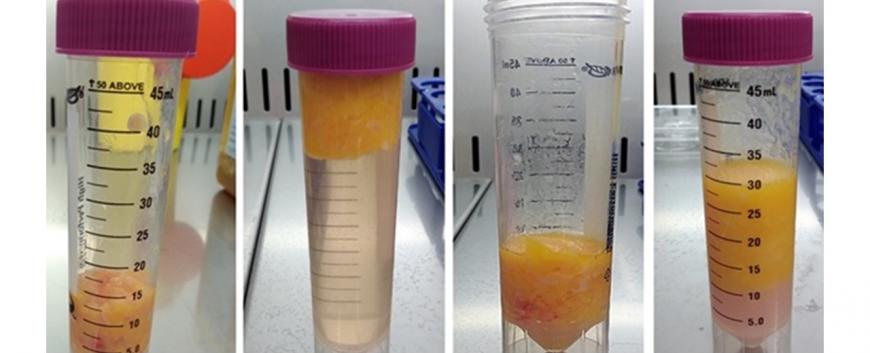
Keywords: bioprinting, tissue culture, stem cell, implant, plastic surgery
The first level of service is the evaluation of the stem cell content of the extracted adipose tissue during personal fat grafting. The lasting result of personal fat grafting depends on the appropriate stem cell content of the adipose tissue. If it is too low, no lasting result can be expected. The Level 1 service evaluates this, providing an objective and scientific basis for deciding whether to perform a personal fat grafting procedure with long-term results.
The second level of service is aimed at enriching the stem cell content of the adipose tissue. If the stem cell content of the extracted adipose tissue is too low to achieve a lasting result, increasing the stem cell ratio may ultimately ensure a lasting result. In this step, although the volume that can be transplanted will be smaller than the initial volume (e.g. 500 ml instead of 1000 ml), the enriched stem cell content will allow a successful personal fat grafting.
The third level of services is directed towards the proliferation and expansion of adipose tissue stem cells. The isolated adipose tissue stem cells first undergo a numerical division without differentiation under appropriate culture conditions. This is followed by adipogenic differentiation of adipose tissue stem cells under appropriate culture conditions. This second level of service is used when an increased stem cell content is required for successful engraftment, but at an increased engraftment volume (e.g. 1000 ml instead of 500 ml).
The fourth level of service involves the fabrication of a tissue-printed scaffold, customised in size, shape and consistency, which is flexible and biocompatible for the permanent attachment of enriched and/or augmented adipose tissue stem cells. This is necessary when the aim is not an amorphous cosmetic space filler but the replacement of silicone implants during personal fat grafting.
Applicability
The market for silicone implants is growing. As the market for silicone implants grows, the incidence of complications increases. These complications call for new solutions, such as the possibility of personal fat grafting in combination with bionic printing technology.
CONTACT
Pécsi Tudományegyetem | Kancellária | Informatikai és Innovációs Igazgatóság 2021.

